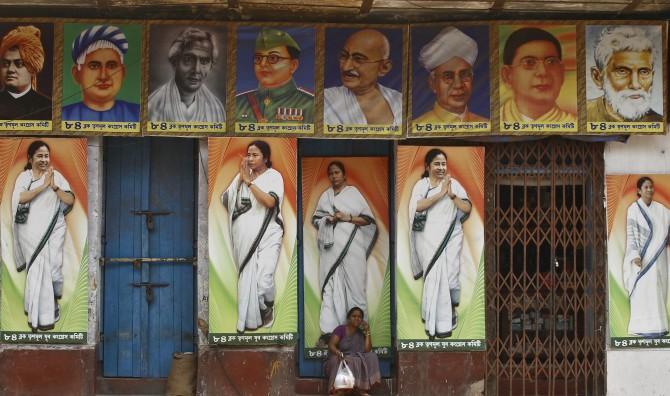Has Chief Minister Mamata Banerjee created a situation with dangerous overtones in Bengal?
In the six years that she has been in power, her detractors feel she has overplayed the politics of appeasement.
Payal Mohanka reports from Kolkata.

An uneasy calm shrouds West Bengal.
A state that prided itself on maintaining communal harmony when violence scarred other regions in the country is now seeing this ugly menace rear its head repeatedly.
Basirhat in the North 24 Parganas district is the latest, after recent communal incidents in Dhulagarh, Malda and Nadia.
Social media is replete with images and videos of one community blatantly taking on another in Basirhat.
The trigger was an offensive Facebook post by a teenager denigrating a Muslim shrine.
The police station where the boy was detained was stoned and the mob demanded that the culprit be handed over to them and tried under Sharia laws.
"It is unfortunate that even after the boy was arrested mobs were allowed to run amok," says a senior police officer.
"The signal was clear: 'Don't shoot the protesters, don't kill as long as they are not killing. Let the storm pass'," he adds.
"Then compensation can be given to those whose homes have been damaged. This is unprofessional handling of a situation," he emphasises. "You cannot allow one community to terrorise another."
Has Chief Minister Mamata Banerjee created a situation with dangerous overtones in Bengal?
In the six years that she has been in power her detractors feel she has overplayed the politics of appeasement.
Muslims comprise 31 per cent of Bengal's population.
A huge vote bank, the chief minister has relentlessly wooed the Muslim community, going to the extent of earmarking a monthly allowance for imams, appearing in huge hoardings during Haj with her head covered and palms raised in prayer.
Her efforts paid off and she came back to power in 2016 with a resounding victory.
But the scenario has now changed. Once the Bharatiya Janata Party emerged at the Centre in 2014 it began to eye Bengal, a state where the BJP were virtually non-existent till then.
In the last three years, the BJP has been stealthily building a base in Bengal where it sees a huge opportunity.
Brimming with confidence and all set to establish his party's footprint further in the state, BJP President Amit Shah declared during a trip to Kolkata in May, 'Bengal is ready for change.'
Mamata Banerjee's platter of woes is near full. After months of seeming apathy, the Central Bureau of Investigation and the Enforcement Directorate have suddenly displayed a burst of energy and once again begun summoning senior Trinamool Congress leaders involved in the 'Narada sting operation'.
As the demand for Gorkhaland gains ground and the hills are ablaze in Darjeeling, the BJP is strident about the breakdown of law and order in Bengal.
And now growing communal unrest wracks the districts.
The BJP is poised to be the sole political beneficiary of the troubled situation in Bengal.
Some go as far as to insinuate the BJP's role in Banerjee's current troubles. A party that is banking on anti-incumbency and consolidating Hindu votes in the state.
Mamata Banerjee's Trinamool Congress is not the only party that has wooed Bengal's large Muslim population.
The Congress and the Communist Party of India-Marxist have done the same in the past.
"Vote bank politics -- playing the communal card -- is nothing new in India. The Congress has always done it," says BJP state executive member Shishir Bajoria.
"Unfortunately, in recent times the Trinamool Congress is taking it to depths we have never seen before," adds Bajoria.
While there was mayhem in Basirhat, the chief minister took on Bengal Governor Keshari Nath Tripathi.
In the past there have been differences between the state government and the governor, but never before has there been an instance where an angry chief minister held a press conference to vent against the governor who she claimed 'insulted, threatened and humiliated' her.
Tripathi issued a statement later saying he had called Banerjee about the deteriorating law and order situation in the North 24 Parganas district.
"The chief minister took on the governor with a view to divert attention from her administrative failure and to further whip up Muslim passions and once again reiterate her stance, 'I am with you'," says a senior state bureaucrat.
"The governor was not out of line," the bureaucrat adds. "He needed to make the call to the chief minister.:
"Had he not intervened, the violent situation would have escalated further."
IMAGE: A scene from Bengal ahead of the 2014 general election. Photograph: Rupak De Chowdhuri/Reuters










